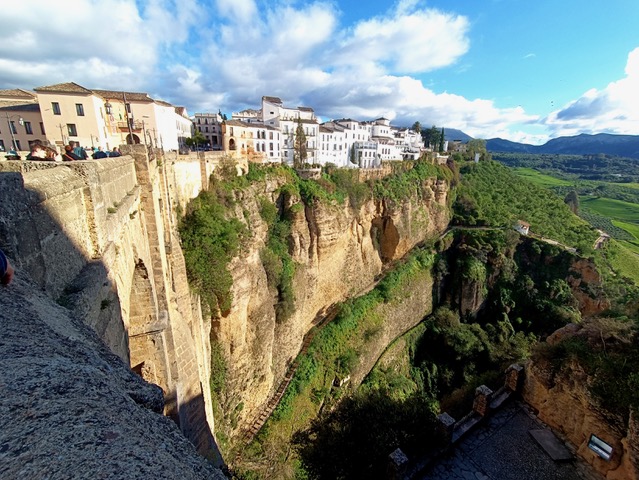
The new trail seen from the Puente Nuevo bridge. Photo © Karethe Linaae
Millions of people have seen Ronda from the bridge that has become one of the symbols of Andalucía – immortalised in Hollywood films, international TV commercials and of course, a billion selfies. But now, you too can have a chance to see the mountain town from below. So, stroll down into the bottom of Ronda’s deep El Tajo-gorge on the newly opened Desfiladero del Tajo.
1,8 million tourists visited Ronda in 2023. I can guarantee that everyone took the compulsory walk in a constant queue of people across the Puente Nuevo bridge. But only a tiny fraction of the visitors dared (and took time to) take the trail that led down and beneath the iconic bridge. However, the so-called Ciudad Soñada (Dream City) now has a new official walking trail, El Desfiladero del Tajo, that brings visitors safely and comfortably into the depths of Ronda to see this cliff town from a whole other angle.
A bit of history
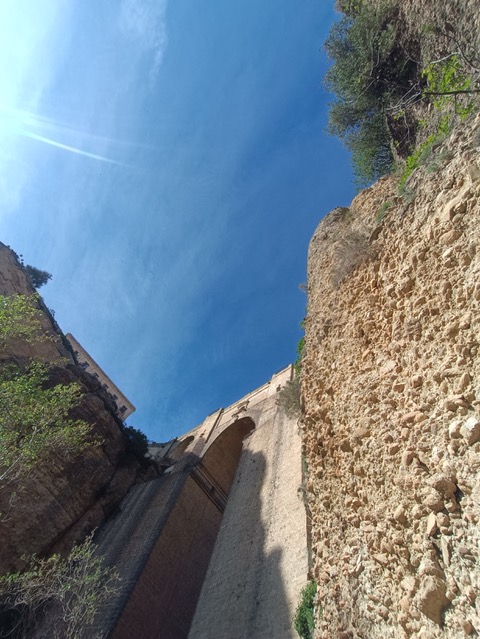
Ronda from below. Photo © Karethe Linaae
Rondas Tajo is a 100-meter deep and 70-meter wide sandstone and limestone gorge that the river Guadalevín created through the millennia. Gradually, erosion of the soft rock shaped the unique rock formations– not only in Spain but perhaps in the world. The river is the main architect for this masterpiece which was declared an Andalusian natural monument in 2019.
The construction of today’s Puente Nuevo (the New Bridge) started in 1751 when the first bridge collapsed after a few years. The bridge which was the most costly in the world at the time, was completed in 1793, only a couple of years after Ronda’s equally famous Plaza de Toros. With its 98-meter height, Puente Nuevo was also the world’s highest bridge until 1839, when a bridge in Caille, France took over the honour.
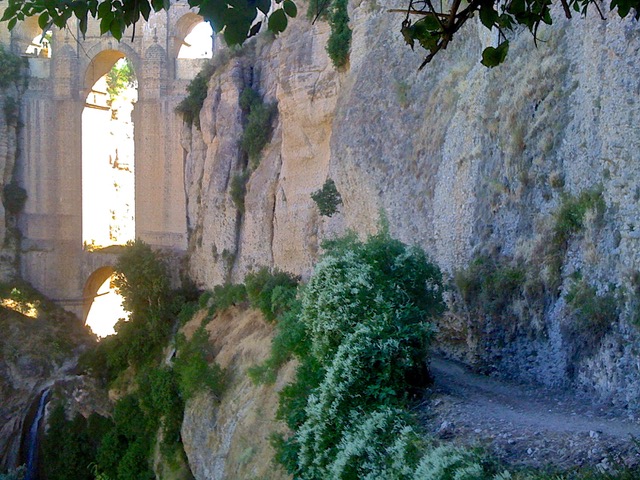
The original trail into Ronda’s gorge. Photo © Karethe Linaae
The original path was dug into the porous cliff face in the 18th Century to bring the construction workers and materials down to the bridge foundations. For years, locals and tourists have snuck down the narrow unprotected path, but after several accidents and years of applications and red tape, Ronda finally got the approval and could reopen the trail - this time extended with a safe wide stone staircase with handrails on both sides.
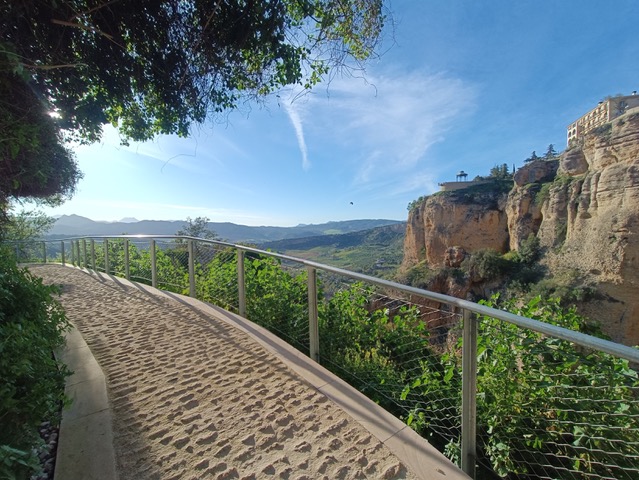
Safe path with a spectacular view. Photo © Karethe Linaae
Of course, purists, nature lovers and those who used to climb down there will prefer the old, modest natural trail. The chain-link fence could admittedly have been replaced with something more pleasing to the eye (and less prison fence-like). But at least it is safe, and overall, one has to say that they have done a fairly decent job.
Now it’s your turn
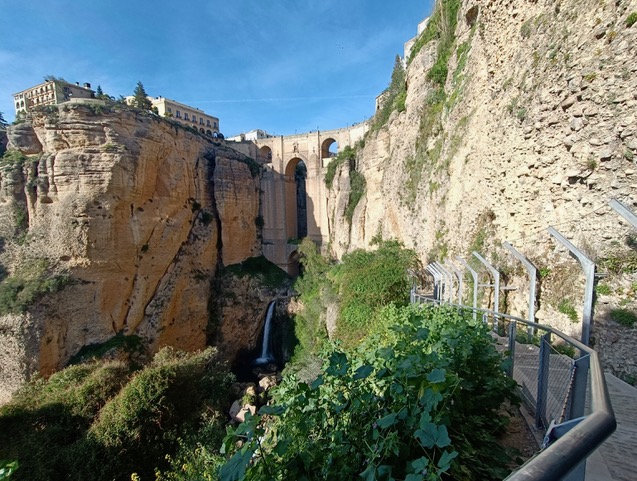
Desfiladero del Tajo, first part. Photo © Karethe Linaae
Prepare yourself for an unforgettable experience right in the heart of Ronda. The journey starts from the Plaza María Auxiliadora in the historic part of town. From here, wide stairs lead down to la Casa de Manolillo, the ruin that has been restored and serves as a visitor’s centre with impressive viewpoints with benches and a first-class view of the bridge. This is where one shows one’s ticket (which ought to be purchased in advance online – see box). Though this may be perceived as an overkill, one also gets provided with a compulsory helmet and hair net. Presently, the local authorities only allow 30 paying visitors at a time and one has an hour to walk down and up the path to take photos and admire the view, so there should be ample time and enough space for everyone.
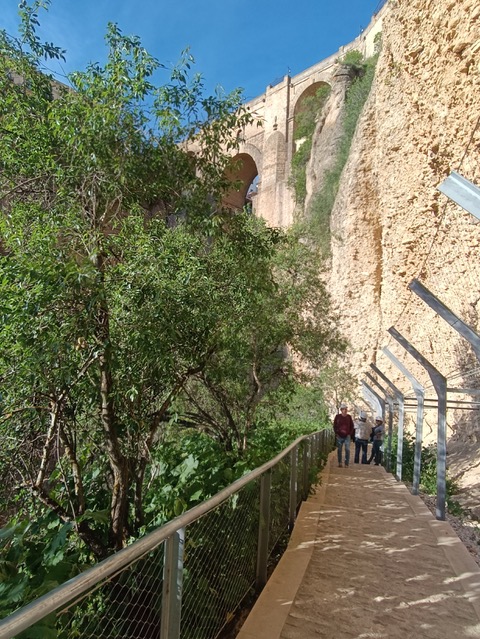
The new path. Photo © Karethe Linaae
On the 250-metre-long path that ends at the bridge’s foundation, one can get to know the town’s history by scanning the QR codes attached to the fence. One can say that Ronda lived off the Tajo gorge, which at one point had thirteen mills along the slope and five mills down in the alley below, some in use until the 1950s. As part of the restoration, the municipality has also cleared trees and foliage around the old mill ruins to make them more visible.
“I don’t like to compare el Desfiladero del Tajo with any other trails, as it is unique”, says Ronda’s historian and chronicler, Faustino Peralta. “This is a historical, geological, monumental, enological and patrimonial path with many characteristics that other paths do not have.”
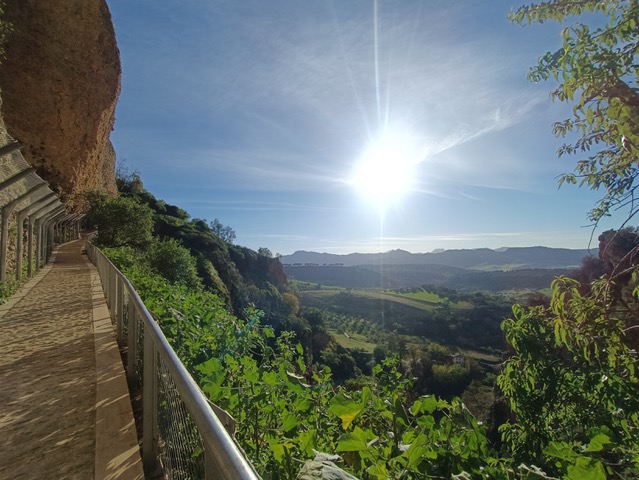
Path with view out towards Ronda’s green valley. Photo © Karethe Linaae
Today the path ends in the bottom of El Tajo, where the bridge and the intensely blue sky are revealed above one’s head. Then, one must return to the starting point. However, this is just the first part of el Desfiladero del Tajo. In a couple of years, visitors will be able to walk on a suspended footpath above the river surface following along under Ronda’s three historical bridges: The new bridge from 1793, Puente Viejo (the Old Bridge) from 1616 and El Puente Romano, the oldest bridge with is said to have both Roman and Arab origins.
In the meantime, el Desfiladero del Tajo is a new, safe and fun activity for visiting families and people of almost any age. Remember to book your tickets online as soon as possible, because just on the first day the website was open, they sold 600 tickets.
For more information: https://desfiladerodeltajo.info/
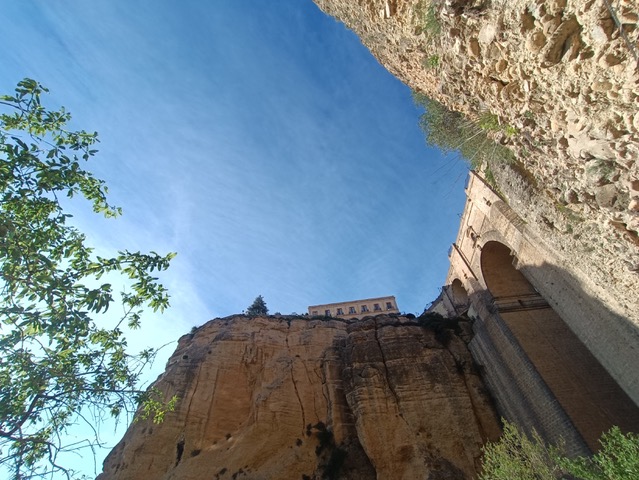
Ronda with Puente Nuevo. Photo © Karethe Linaae